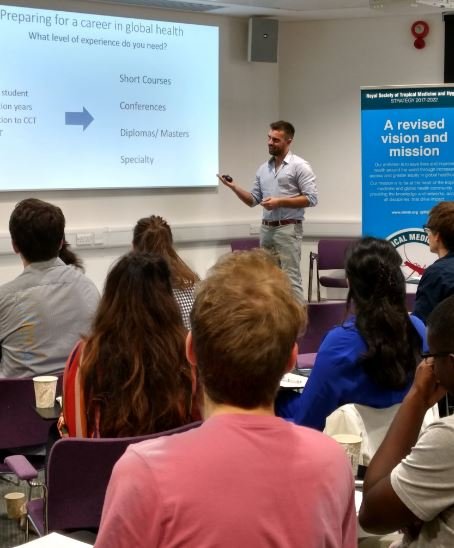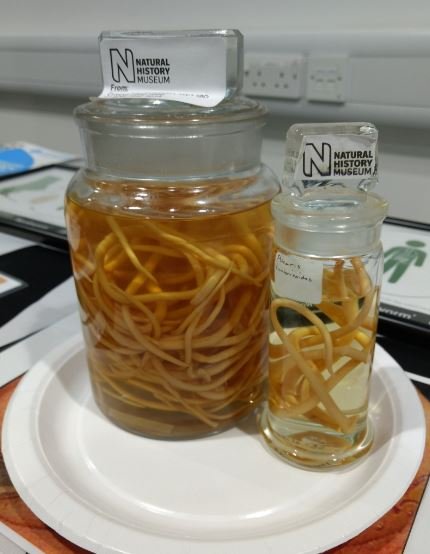Our first Careers Day on global health and tropical medicine
On 15 September 2018, we held our first Careers Day event for medical students, at Imperial College London. The one-day event was what we hope to be the first of many similar meetings that we hope to perfect and roll out across the UK in the coming months and years.
Committed to supporting those in their early career

Under our new five-year strategy, which we launched last year, we committed to supporting early career researchers and professionals to develop their careers in tropical medicine and global health.
Having spoken to many students of medicine and other global health subjects (at events such as Wilderness Medicine and Students for Global Health’s meetings) we were requested to hold a one-day event where students could hear about a variety of aspects of a career in the field.
They wanted to hear about what tropical medicine means today, whether it be infectious diseases, funding, publishing or more.
They wanted to hear about what kinds of diseases they’re likely to see in their work and what approaches are being undertaken to combat them. They were also keen to hear from those who have spent whole careers or short stints overseas working directly with patients.
We provided our attendees with a full day which touched on all of these things.
Technology in global health
Professor David Mabey, Professor of Communicable Diseases at the London School of Hygiene & Tropical Medicine started the day by talking about progress towards the MDGs (now SDGs). Touching on the progress on fighting HIV, he mentioned the helpfulness of technology such as rapid diagnostic tests for malaria, and also about his work in the Gambia on Trachoma.
He talked us through the London Declaration meeting held in 2012 attended by Bill Gates, Margaret Chan and representatives of World Bank, UNICEF, UNDP and 13 pharmaceutical companies to set and support elimination and eradication targets for neglected tropical diseases through drug donations.
Working through the recent Ebola crisis

This set the scene wonderfully for Dr Naomi Walker who works as an academic clinical lecturer and at the Hospital for Tropical Diseases. She told us about her time as a clinical volunteer in Uganda and Tanzania, which put her in a strong position to work on the Ebola crisis in Sierra Leone.
Dr Charlotte Hall, a consultant in infectious diseases in Bristol, then took us through how working in tropical medicine fits in with UK training for medical students and explained how some of the hardest decisions are not clinical at all. She told us about her time in Timor-Leste and gave examples of how students can get involved in tropical medicine work.
During the lunch break we saw soil-transmitted helminth specimens provided by de-worm 3 at the Natural History Museum, brought by Catherine Wheller, and students had a chance to hear the de-worm rap.
The afternoon was a selection of talks from various speakers providing more practical support for students including Dan Korbel from the British Council taking the group through the complex pathways for funding for research in the UK.
Conor Kenny, a doctor in the UK who has recently returned from an MSF mission on the boat Aquarius, treating refugees in the Mediterranean explained about the MSF journey and his mission experience, including settling back into work here.
How to get research published
Dr Adrian Hopkins MBE explained his experience of how the best plans for medicine can be changed and how that led him to be one of the only physicians working in the interior of the Congo for 17 years, meaning that he didn’t practise his main skill as an ophthalmology surgeon.
The group also heard from Clodagh McGuire in our team about how to get your research published, and finally we heard about life as an army medic from Captain Scott Pallett, who has worked in many different environments in his time as an infectious diseases doctor.
The meeting also saw us announce our new student essay competition that we’ll be launching in a couple of weeks.
The students who attended tell us they heard a great deal of new information and appreciated the mix of theory and practical examples in one event. They rated the meeting highly which means we’ll try and get more feedback and see if we can roll it out across different cities in the UK.
Although this event was for medical students only, as a trial, we would hope to be able to deliver a meeting for students in wider global health courses.
For information on the latest courses in global health